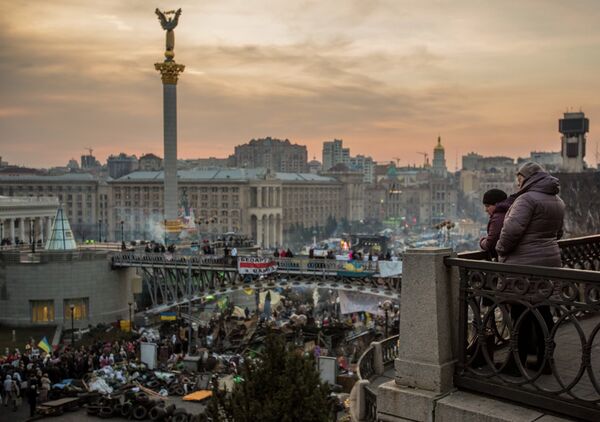KIEV, May 8 (RIA Novosti) – Friday's Victory Day holiday in Ukraine comes against a backdrop of escalating tensions in eastern regions and heightened nationalist rhetoric elsewhere, with pro-coup activists in Kiev gearing up for a witch hunt to thwart possible “provocations.”
Victory Day marks the final defeat of Nazi Germany by the Soviet Union in World War II, known in Russia and some former Soviet republics as the Great Patriotic War.
On Monday, the regime in Ukraine said the traditional military parade in the country’s capital Kiev would be ditched in favor of a prayer service for the victims of World War II for fear of provocations. Most regional authorities across Ukraine followed suit, saying celebrations would be limited to wreath laying ceremonies.
Russian Prime Minister Dmitry Medvedev and Upper House Speaker Valentina Matvienko criticized the decision. Medvedev said that “for Russian and Ukrainian citizens … it is a holy and sacred day.”
Matvienko said the Victory Day parade, a must for many ex-Soviet republics, was “a symbol of victory over the worst threat that has ever loomed over humanity,” adding the march was a tribute to those who contributed to the defeat of Nazi Germany.
V-DAY WITCH HUNT IN KIEV
The Victory Day celebration in Kiev has been planned as a sign of Ukraine’s commitment to what it considers Western values, with the traditional St. George Ribbon to be swapped for the US remembrance poppies to commemorate war victims.
A poppy by Kharkiv designer Serhiy Mishakin has been adopted as an official emblem for this year’s Victory Day. It is a stylized red flower shaped after a bloody bullet trace accompanied by a motto “1939-1945. Never Again.”
Many have condemned the decision, saying the absence of the traditional ribbon from the May 9 ceremonies will upset veterans and people who cherish it as a token of military valor and a tribute for fallen Soviet heroes, not to mention the added value the ribbon has gained after becoming a symbol of the anti-Maidan resistance.
In Kiev, the police and army presence has been boosted in case of violence. Nine roadblocks encircle the Ukrainian capital to keep alleged instigators away, with local residents planning to coordinate anti-provocateur patrols on the holiday.
EASTERN UKRAINE
Authorities in Eastern Ukraine have faced a tough choice of balancing their patriotic sentiment with security concerns.
Experts believe that Victory Day will boost the resolve of protesters in the country’s southeast, in the light of the regime’s ongoing campaign against greater regional autonomy, since for many federalists the holiday has come to stand for their right to speak the native Russian language and respect the deeds of their ancestors.
But security remains a high priority for governments in the restive eastern cities of Kharkiv and Luhansk, where mass events have been cancelled and residents have been urged not to take their children out to crowded places.
Donetsk seems to be one of the few exceptions. City authorities the traditional ceremonies would not be cancelled, although it called on people to refrain from political rallies.
ODESSA FEARS MORE BLOODSHED
The Ukrainian flashpoint city of Odessa on the Black Sea has also cancelled many of its Victory Day celebration plans for fear they could stoke more violence after the latest outbreak injured over 200 and left dozens dead following a fatal blaze at a trade union hall on May 2.
The port city is going to confine the celebrations to a brass band concert and a children’s choir performance in the central square.
On Tuesday, unidentified attackers threw grenades into tents near roadblocks protecting the entrances to Odessa and set the camp ablaze. Federalization supporters controlling the roadblocks of the mostly Russian-speaking Black Sea port city are preparing for possible attacks ahead of the Victory Day celebration on May 9.


